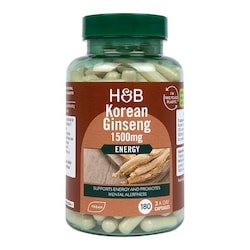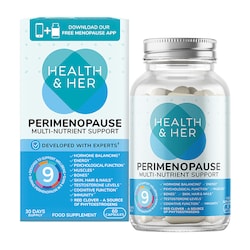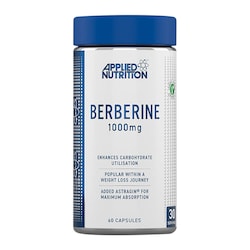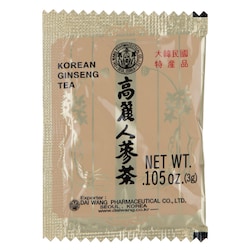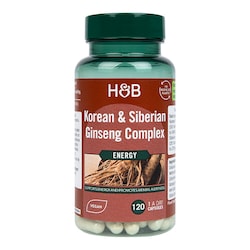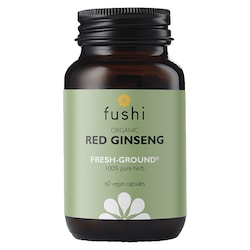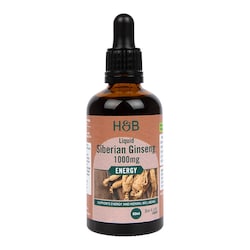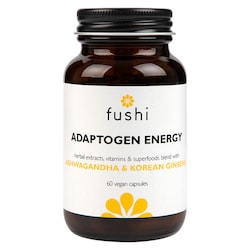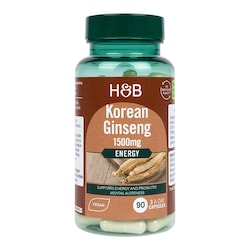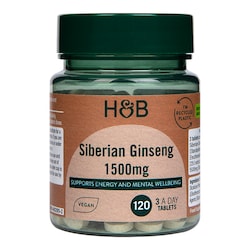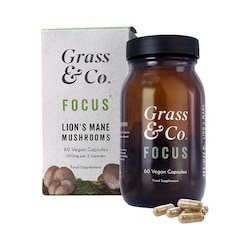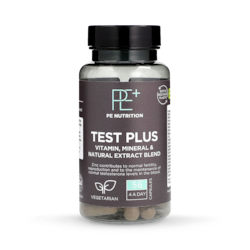20% off £30
Code:QUICK
Benefits of ginseng

What is the herbal remedy Ginseng good for? Find out about its benefits to your energy, brain and stress levels. Plus safe dose levels and side effects.
Summary
1What does ginseng do in the body?
Ginseng is thought to have the following effects: It can help reduce fatigue. Ginseng can be used for short-term treatment of fatigue, weakness and...
2Dosage: How much ginseng is safe to take?
There is no standard dose of ginseng, so make sure you follow the instructions on the label carefully...
3What are the side effects of taking ginseng?
Ginseng is considered safe to take. However, side-effects reported from ginseng include: Allergic reactions, such as itching or a rash, digestive...
Ginseng is a popular herbal remedy that grows in parts of Asia and northern America.
The roots of ginseng plants have been used as a herbal remedy for centuries in China, Korea and other Asian countries.
What is ginseng and what does it do?
Traditionally, ginseng has been used:
- to support energy production
- support cognition function
- help maintain normal blood sugars
- balance cholesterol
- prevent sexual problems in men1,2
Nowadays, ginseng is most commonly used as a herb to help reduce tiredness and restore vitality.3
There are two types of ginseng:4
- White ginseng – this is made using dried ginseng root
- Red ginseng – the root is dried, then steamed
Ginseng is available as capsules, liquid extract or as a tea.
What does ginseng do in the body?
Ginseng is thought to have the following effects:
- It can help reduce fatigue
Ginseng can be used for short-term treatment of fatigue, weakness and lack of vitality, according to the European Medicines Agency's Committee on Herbal Medicine Products (HMPC).5
Handpicked content: All about fatigue
- It can stabilise blood sugar
A number of studies suggest ginseng can help to regulate blood sugar levels.
For example, a 2018 study in the Journal of Psychopharmacology reported that Panax ginseng reduced blood sugar within one hour of consuming it.6
- It may support your brain
Scientists think ginseng has a stimulatory effect on the brain.7
In fact, the above study found that after taking ginseng, participants performed better on a mental arithmetic test than those taking the placebo.8
Meanwhile, a 2010 study by Northumbria University reported that 400mg of ginseng taken daily for eight days increased participants’ sense of calmness and ability to perform mental arithmetic.9
However, other studies into ginseng’s effect on memory and concentration have had mixed results, so more research is needed.
Handpicked content: Best supplements to support your brain & memory
- It can increase blood circulation
In 2013, Korean scientists also reported that red ginseng in particular can dilate blood vessels – improving the flow of blood not just through each vein, but throughout the whole circulatory system.10
Handpicked content: 10 easy ways to boost your circulation

Dosage: How much ginseng is safe to take?
There is no standard dose of ginseng, so make sure you follow the instructions on the label carefully.
Ginseng root medicines should only be used by adults and taken for no longer than three months.11
If you are on medication, talk to your GP before taking ginseng – it can interact with certain medicines, including warfarin and aspirin.12
The following groups should not take ginseng:
- Children under 12 – this has not been proven safe
- Pregnant or breastfeeding women – scientists are not certain this is safe
- People with diabetes, as ginseng can interact with blood sugar levels
What are the side effects of taking ginseng?
Ginseng is considered safe to take. However, side-effects reported from ginseng include:
- Allergic reactions, such as itching or a rash
- Digestive problems including nausea and diarrhoea
- Headaches
- Sleep issues
- Changes to blood pressure13
Ginseng is a stimulant, so you may also experience more enhanced effects after drinking caffeine, such as a racing heart and insomnia.14
If you experience any of the symptoms above, stop taking ginseng and talk to your GP.
Watch out for Siberian ginseng
Confusingly, Siberian ginseng isn’t actually ginseng, since it doesn’t contain any ginsenosides.
It is, however, packed with eleutherosides, which are pretty nifty in their own right…
Researchers have identified:
- 6 components of Siberian ginseng with antioxidant properties
- 3 components with cholesterol-lowering properties
- 2 components which stimulate the immune system
- 1 component which may help control insulin
- 1 antibacterial component
The advice in this article is for information only and should not replace medical care. Please check with your GP or healthcare professional before trying any supplements, treatments or remedies. Food supplements must not be used as a substitute for a varied and balanced diet and a healthy lifestyle.
Last updated: 3 September 2021
- https://www.medicalnewstoday.com/articles/262982
- https://www.healthline.com/nutrition/ginseng-benefits
- https://www.ema.europa.eu/documents/herbal-report/final-assessment-report-panax-ginseng-ca-meyer-radix_en.pdf
- https://www.ncbi.nlm.nih.gov/pmc/articles/PMC3659626/
- https://www.ema.europa.eu/documents/herbal-report/final-assessment-report-panax-ginseng-ca-meyer-radix_en.pdf
- https://www.researchgate.net/publication/7369567/
- https://www.ncbi.nlm.nih.gov/pmc/articles/PMC4503934/
- https://www.researchgate.net/publication/7369567/
- https://www.ncbi.nlm.nih.gov/pubmed/20737519
- https://www.ncbi.nlm.nih.gov/pubmed/23596810
- https://www.ema.europa.eu/documents/herbal-report/final-assessment-report-panax-ginseng-ca-meyer-radix_en.pdf
- https://www.medicalnewstoday.com/articles/262982
- https://www.medicalnewstoday.com/articles/262982
- https://www.medicalnewstoday.com/articles/262982


